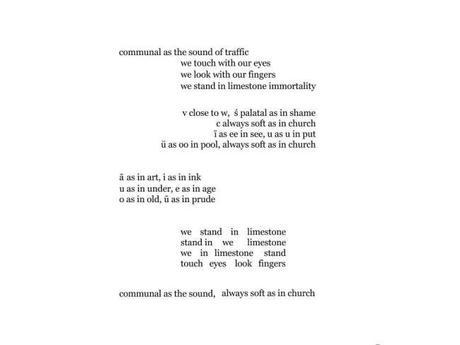The past 10 weeks have been interesting because I signed up for an online course offered by the Kelly Writer’s House at University of Pennsylvania. Modern and Contemporary American Poetry is a Massive Open Online Course facilitated by the Coursera platform that boasts a participation of some 30,000 plus students from around the world. The Kelly Writer’s House is well equipped to manage this, with a team of 8 Teacher’s Assistant’s by the side of Dean Al Filreis. Filreis seems to be quite involved in the contemporary poetry scene, moving with the likes of Charles Bernstein, Bob Perelmann, Ron Silliman, and others through his Poem Talk podcast series that is syndicated on iTunes, Jacket2, and Poetry Foundation.
I was turned on to American poetry by a Bengali college-mate in Chennai, who let me flip through the massive Collected Poems of Allen Ginsberg, after I showed interest in his collection of Arthur Rimbaud translations. I would share my own poetry with him, and he would show me the poems that he wrote at the time. There was one called Echo, I think, that was quite meta-poetic in the sense that the concept was carried through in the form, in the manner of a refrain of some lines or placement of ideas. This idea of “meta” I seem to come across in many pseudo-intellectual conversation on micro-con-dense-d Twitter back and forths, but I only really understood the depth of the tag “pseudo” while observing Bengalis, otherwise crudely known as “Bongs”. I had a Bong Keats fanatic as a roommate – a real mama’s boy who didn’t know how to make his bed and never changed his sheets throughout the course, leaving a mark of sweat-stain against the mattress. I did not care for his romanticization of Keats. I called him out on his flouting about of Shakespeare once while a group of us boys were having a drink in the opposite room. I asked him, if he was so into his Shakespeare, that I would lend him an ear, if he would recite Act 2, Scene 7, As You Like It, Jacques Monologue. The request left him dumbfounded, and he claimed he could not recall on demand. So I began with “all the world’s a stage”, and my Malayali friend (crudely known as Mallurs) carried on into the next line, and we continued in unity, mocking the poor bastard. We was a Masters graduate from Presidency College, a big deal in West Bengal, about 20 years ago. This guy was 27 years old, a real man-child.
Anyway, I digress. But here is another observation on modern poetry – it is all digression. It seems that since about the time that Robert Frost penned The Road Not Taken, the “difference” has been spreading (as Gertrude Stein states in A Carafe, That Is A Blind Glass). The course has required me to pen my thoughts on some of the poems that make up the reading material, which has had me perform very close readings of the poets’ work and also pay attention to the discussions and look through essays written by academics. I am an absolute stranger to literature as a discipline, and have no experience with the academic canon of English Literature. In school I thought it was preposterous that kids my age would sit around and assume they could fathom what the author had in mind. Now I have learnt the word pretentious and use it whenever I can. There’s another meta-moment. Oh, and a pseudo moment. I AM A JAR; LABEL ME.
So, after being introduced to the work of Ginsberg, I immediately dove into the resources I could find: PennSound, Poetry On Record: 98 Poets Read Their Work, Jacket2, Asymptote Journal. Trawling through the massive content base at PennSound, I came across the ecstatic performances of Christian Bök, whose Eunoia I was introduced to by a spoken word poet Shafni Awam, and then stumbled upon the poetry of Amiri Baraka & Etheridge Knight, whose work was also present on the Poetry On Record collection, and then came across Lorenzo Thomas, a fairly unheard of poet. I have become quite attached to some of their poems, and I have never had that experience before. I think it is because I have been able to listen to the words fall off the poet’s mouth. This might also be why I am so enthusiastic about the Poetry P’lau, which has now been active for more than two years. Below I am sharing a piece that I constructed from a technique I was exposed to through Jacket2 and was inspired by a discussion on poets Heather Fuller and Melanie Nielson use of metaphor in their work. It is an exercise in found language, a method that employs language found in non-poetic contexts and are then re-contextualized by the poet by placing them on the page. Here I have used a line from the aforementioned discussion, a line from a book on Einstein and meta-physics in everyday language, and phonetic pronunciation guides to transliterations of Sanskrit and Pali texts. I call it “Karst Typography”. It is meant to be read out aloud, preferably by a crowd. I had 15 copies handed out to those present at the Poetry P’lau held in October, and we all read it together, and by the third word had set into a groove and a rhythm. I was expecting disorientation. Let the pseudo-intellectualism continue.

